Assisted dying bill - latest: MPs vote in favour of historic legislation following fierce debate
The Terminally Ill Adults (End of Life) Bill received 330 ayes and 275 noes, a majority of 55 votes
Your support helps us to tell the story
From reproductive rights to climate change to Big Tech, The Independent is on the ground when the story is developing. Whether it's investigating the financials of Elon Musk's pro-Trump PAC or producing our latest documentary, 'The A Word', which shines a light on the American women fighting for reproductive rights, we know how important it is to parse out the facts from the messaging.
At such a critical moment in US history, we need reporters on the ground. Your donation allows us to keep sending journalists to speak to both sides of the story.
The Independent is trusted by Americans across the entire political spectrum. And unlike many other quality news outlets, we choose not to lock Americans out of our reporting and analysis with paywalls. We believe quality journalism should be available to everyone, paid for by those who can afford it.
Your support makes all the difference.MPs have voted in favour of the assisted dying bill following a fierce commons debate.
The Terminally Ill Adults (End of Life) Bill received 330 ayes and 275 noes, a majority of 55 votes.
In a sign of the level of feeling on the divisive issue, more than 160 MPs made bids to speak during Friday’s Commons debate – the first on the issue in almost a decade.
The bill will now go to the committee stage where MPs can table amendments, before facing further scrutiny and votes in both the House of Commons and the House of Lords, meaning any change in the law would not be agreed until next year at the earliest.
The law would allow terminally ill adults in England and Wales with less than six months to live to end their lives, subject to the approval of two doctors and a High Court judge.
Warning: this article contains information that people might find distressing, including accounts of human suffering.
Kim Leadbeater: Too many people are experiencing ‘human suffering’ as a result of the ‘status quo'
Labour MP Kim Leadbeater has told MPs about a former police officer who felt he could not visit the Swiss Dignitas clinic with his mother.
The MP for Spen Valley told the Commons: “Former police officer James waved his mum off as she embarked on her final trip to Dignitas. She had terminal vasculitis.
“James desperately wanted to accompany his mum and hold her hand during her final moments, but he knew because of his job as a police officer it was just not possible – indeed, she insisted he must not go with her. So she went alone. No one to hold her hand, no proper goodbye or funeral.
“These are just a few examples of the heartbreaking reality and human suffering which far too many people are experiencing as a result of the status quo. And the public know this.”
Ms Leadbeater later said: “Let’s be clear, we are not talking about a choice between life or death, we are talking about giving dying people a choice of how to die.”
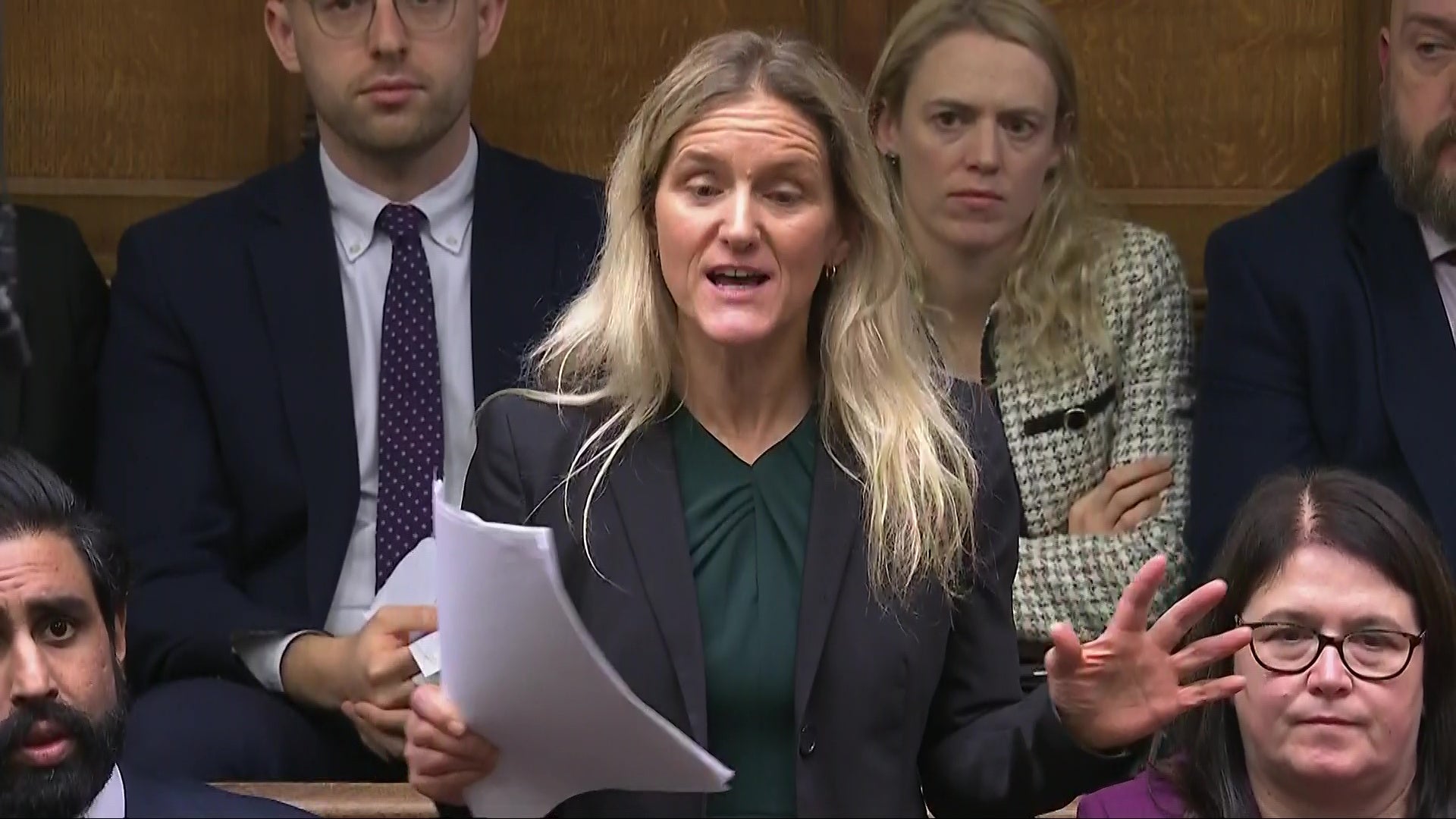
Kim Leadbeater recounts stories from members of the public to packed chamber
Labour MP Kim Leadbeater recounted stories she had been told by members of the public.
The Spen Valley MP told the Commons: “Warwick was married to his wife Ann for nearly 40 years. She had terminal peritoneal cancer, which meant she couldn’t breathe properly. She spent four days gasping and choking, remaining awake throughout despite being given the maximum dose of sedatives, and eventually died of suffocation.
“She had begged Warwick to end her life, but as he stood over her with a pillow, he could not do what she asked as he didn’t want that to be her final memory of him.
“Ann had excellent palliative care but it simply could not ease her suffering.
“Tim fell in love at first sight when he met his wife Louise – he proposed after just three days. But Louise got cancer twice, and at the end the morphine simply could not control her pain. In desperation she managed to smash a small glass bottle and tried to take her own life, not realising that her toddler daughter had got into bed with her.
“Tim found her, he says ‘you get to a point where you stop praying for a miracle and start praying for mercy’.”
Pictured: Campaign group Dignity in Dying demonstrate outside parliament
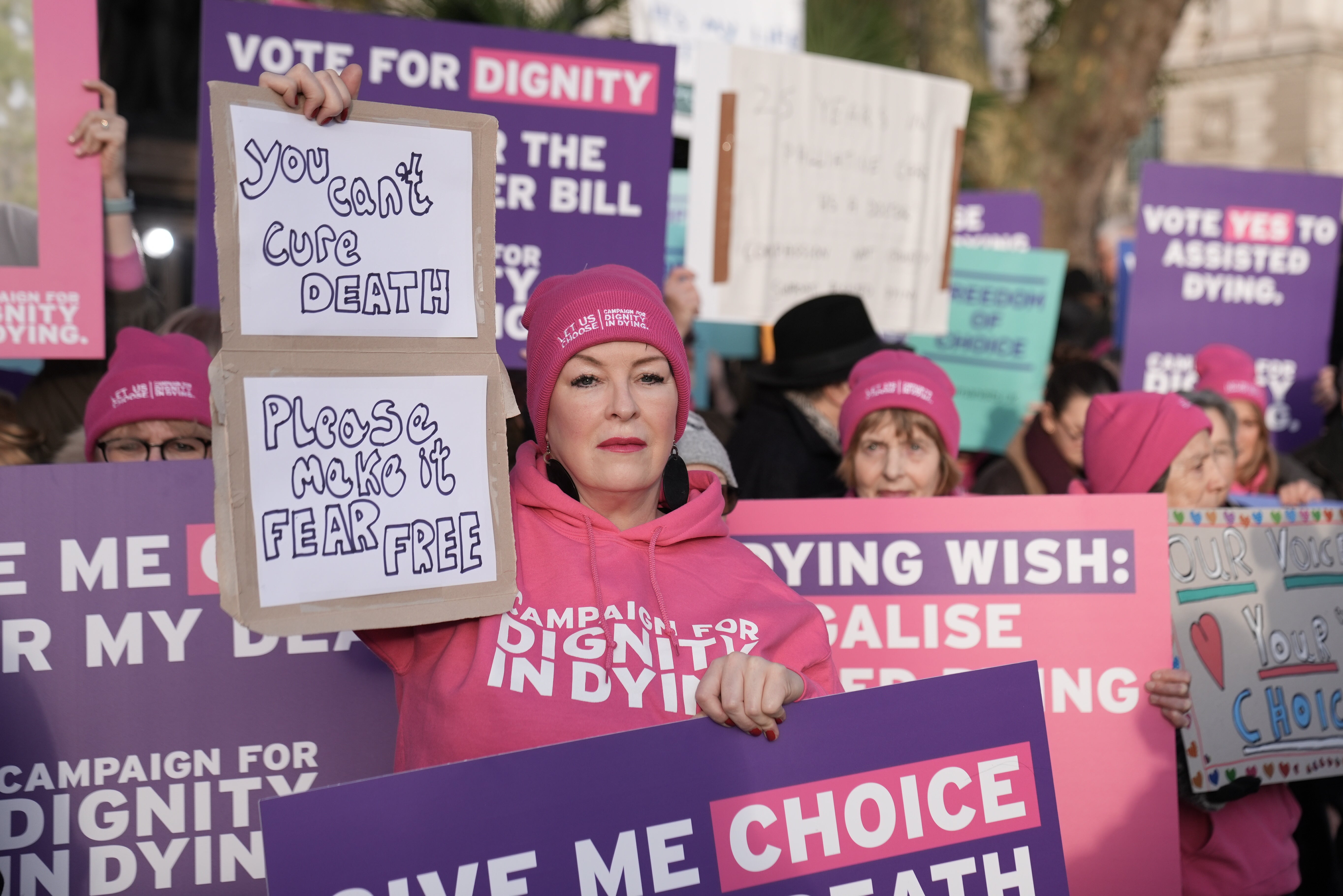
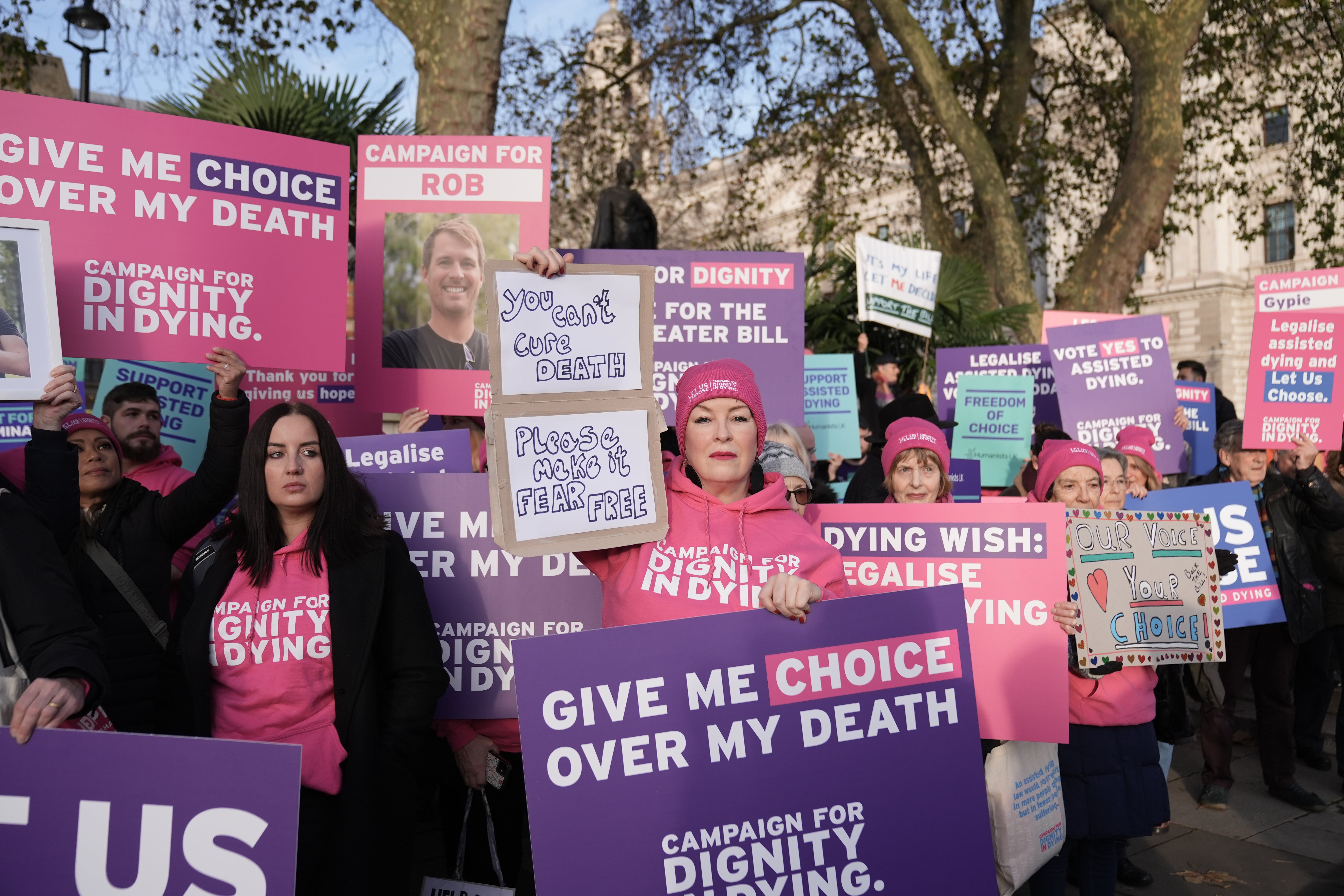
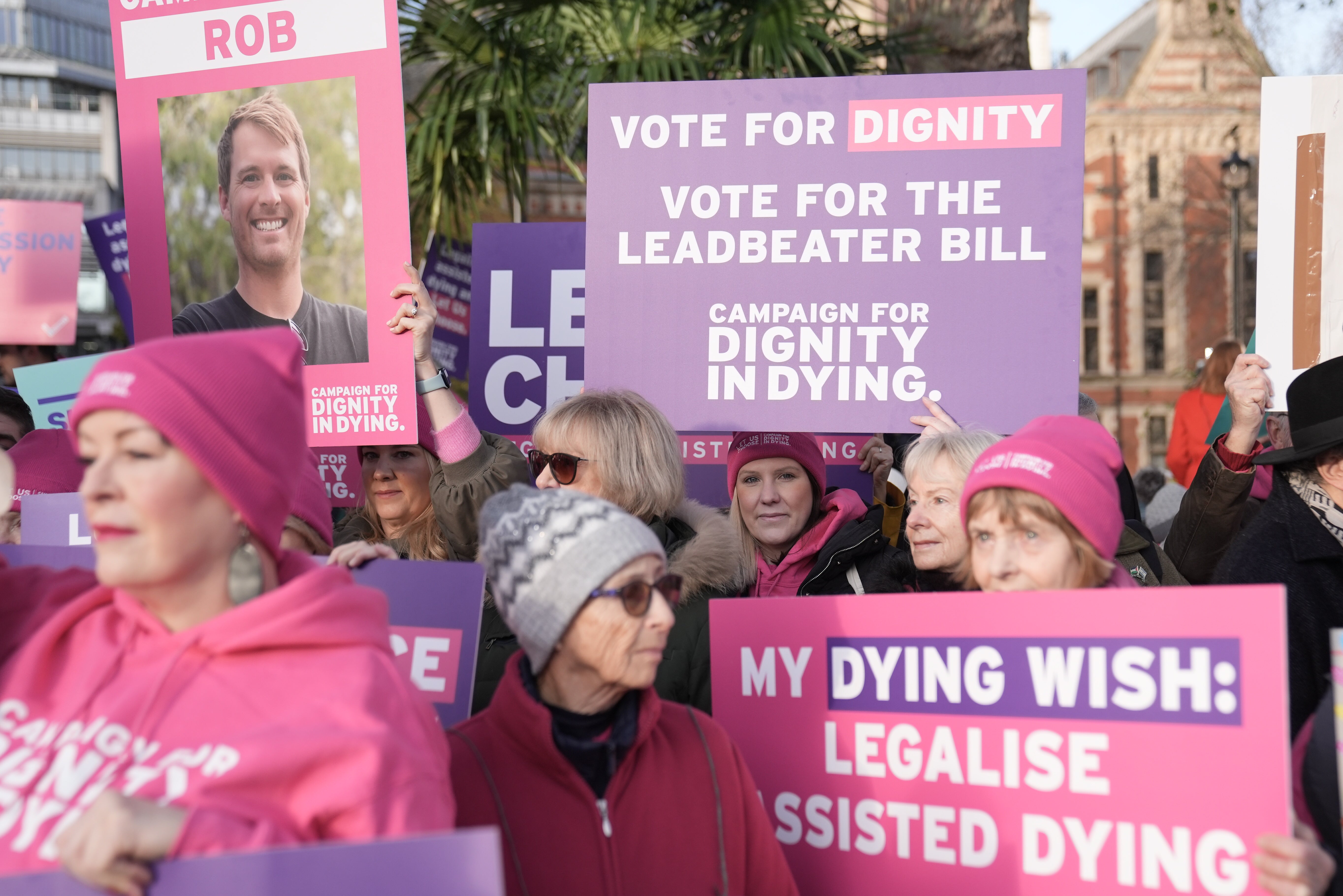
Labour’s Kim Leadbeater opens debate
Labour MP Kim Leadbeater, the one behind the bill, said the assisted dying Bill will give people “choice, autonomy and dignity” as she opened the debate in the Commons.
The MP for Spen Valley told MPs: “It is a privilege to open the debate on the Terminally Ill Adults (End of Life) Bill – a piece of legislation which would give dying people, under very stringent criteria, choice, autonomy and dignity at the end of their lives.”
She added: “And let me say to colleagues across the House – particularly new colleagues – I know that this is not easy. It certainly hasn’t been easy for me. But if any of us wanted an easy life I’m afraid we are in the wrong place.
“It is our job to address complex issues and make difficult decisions. And I know for many people this is a very difficult decision.
“But our job is also to address the issues that matter to people, and after nearly a decade since this subject was debated on the floor of the House, many would say this debate is long overdue.”
The Speaker has not selected MPs' wrecking amendment
A bid by a group of MPs to force extended debate on the Assisted Dying Bill has failed, with the speaker of the house not selecting their amendment.
Dr Ben Spencer, a Conservative MP, Munira Wilson, a LibDem MP, and Labour’s Anna Dixon co-sponsored a “wrecking amendment” that could have stopped the Bill in its tracks if enough MPs supported it.
The proposed amendment would have halted the debate on the Assisted Dying Bill and forced “sufficient debate” on the issue.
Sir Lindsay Hoyle has not selected the amendment, ending their attempt to stop the Bill.
MPs split over fiercely debated bill
With the monumental assisted dying vote looming, neither camp will quite sit comfortably until the results are in at 2.30pm.
In the weeks since the The Terminally Ill Adults (End of Life) Bill was presented to parliament, campaigners for and against have each had spells of momentum.
After health secretary Wes Streeting and justice secretary Shabana Mahmood came out against the change, the bill looked dead in the water, with fresh-faced MPs looking to senior colleagues for guidance.
But, speaking to MPs on the estate, it is clear the high profile interventions against sparked a decisive uptick in lobbying from those supporting assisted dying.
Of those MPs who have come out in favour of the bill, a significant majority support it. But with hundreds of MPs still sitting on the fence, anything could happen in the voting lobbies.
Dozens of protesters outside parliament as MPs begin debating
Dozens of protesters have gathered outside Parliament on Friday calling on MPs to vote against Kim Leadbeater’s Private Members Bill to legalise assisted dying.
Protesters held signs with “Kill the Bill, not the ill” and “care not killing” as they gathered at Old Palace Yard.
They chanted “assistance to live, not to die”.
One attendee, John Smith, 59, said he was “angry and scared”.
“I’m angry and scared about this assisted suicide Bill if it becomes law,” he said.
“I am concerned that if this Bill comes through it will fundamentally change the relationship between patients and doctors. My good health is dependent upon the relationship I have with a doctor.
“Doctors can now, if this Bill goes through, can actually bring up the idea that maybe assisted suicide is an option for you. I don’t want doctors to be conflicted, I want them to assist me to live.”
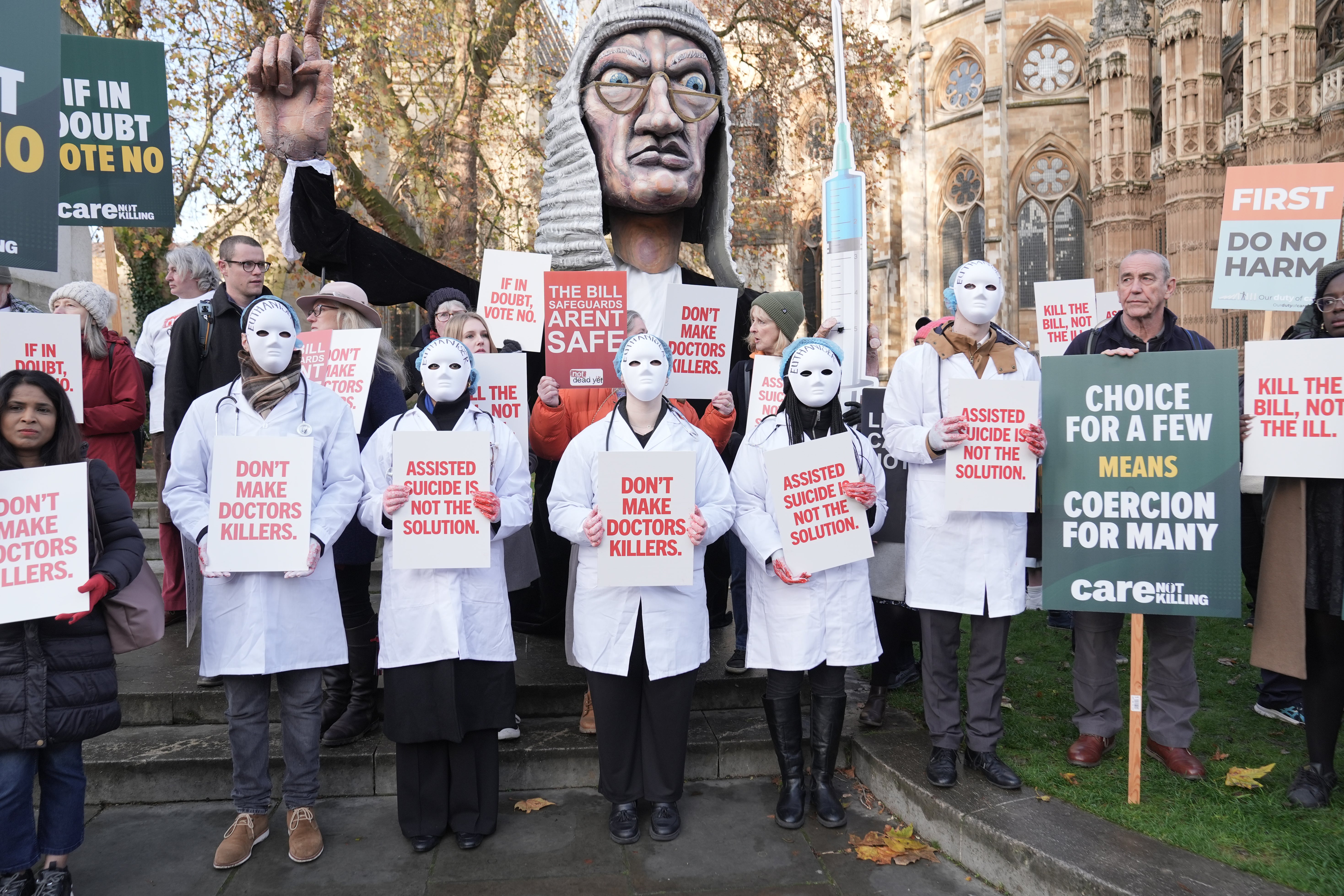
Watch live: MPs begin debating on historic assisted dying bill

Watch live as MPs vote on assisted dying bill
Watch live as MPs vote whether or not to legalise assisted dying on Friday (29 November).
Critics of the bill warn of the risks
Opposition campaigners have warned of the risk of people feeling coerced into taking their lives.
Baroness Tanni Grey-Thompson and actress and disability campaigner Liz Carr are among the well-known faces to have spoken out against the Bill.
Ms Carr said: “It’s no exaggeration to say that many disabled people are terrified of this Bill being voted in. Our recent past showed us how ill, older and disabled people’s lives are viewed as less valuable and more disposable.
“Set against this backdrop of inequality, bias and disadvantage, we do not believe any safeguards could protect us from the inevitable abuse, pressure, coercion and mistakes made under the Leadbeater Bill.”
The equality regulator has said that Parliament should be given more information and assurance that the Bill is compatible with human rights.
The Equality and Human Rights Commission (EHRC), which said it is neutral on assisted dying, also said Parliament will need “adequate time, expertise and the supporting materials required to effectively scrutinise” the Bill.
EHRC chairwoman Baroness Kishwer Falkner said it is “essential” that any assisted dying law “upholds everyone’s rights”.
Who would eligible for for assisted dying and how would the process work?
Only terminally ill adults who are expected to die within six months and who have been resident in England and Wales and registered with a GP for at least 12 months.
They must have the mental capacity to make a choice about the end of their life and be deemed to have expressed a clear, settled and informed wish – free from coercion or pressure – to end their life.
The terminally ill person must make two separate declarations, witnessed and signed, about their wish to die.
The process must involve two independent doctors being satisfied the person is eligible and the medics can consult a specialist in the person’s condition and get an assessment from an expert in mental capacity if deemed necessary.
A High Court judge must hear from at least one of the doctors regarding the application and can also question the dying person as well as anyone else they consider appropriate.
There must be at least seven days between the two doctors making their assessments and a further 14 days after the judge has made a ruling, for the person to have a period of reflection on their decision.
For someone whose death is expected imminently, the 14-day period could be reduced to 48 hours.

Join our commenting forum
Join thought-provoking conversations, follow other Independent readers and see their replies
Comments